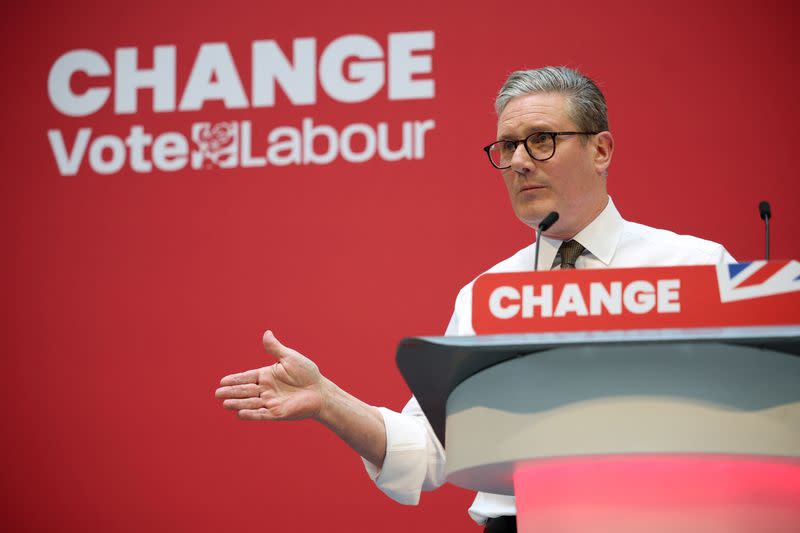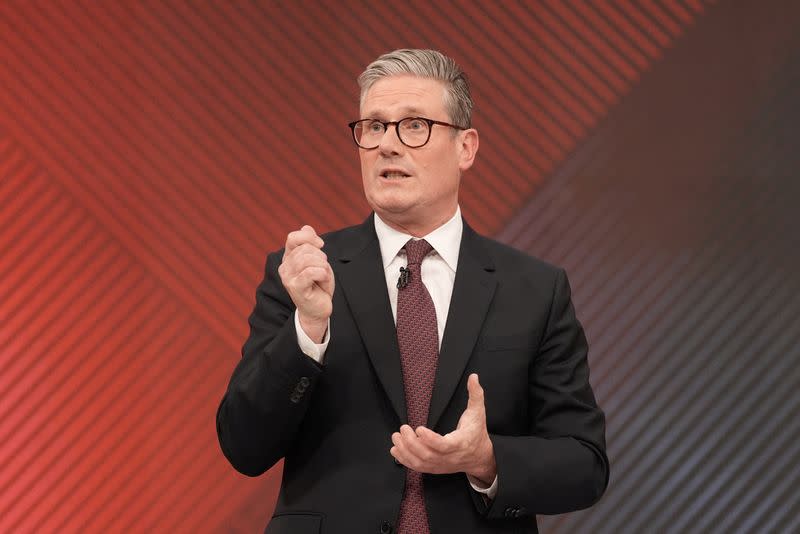UK Labour leader Starmer stakes all on wealth creation with election offer
By Elizabeth Piper and Alistair Smout
MANCHESTER, England (Reuters) -British opposition Labour leader Keir Starmer put wealth creation at the heart of his pitch to voters on Thursday, vowing to provide political and economic stability to help businesses reignite the country's paltry rate of economic growth.
With three weeks to go before an election that polls say he is on course to easily win, Starmer launched a blueprint for government that signalled, if elected, he would govern more in the mould of Labour's former leader Tony Blair and would break with the leftist-tradition of his predecessor, Jeremy Corbyn.
He rejected Labour's long-held image of being a "tax and spend" party - potentially alienating its left wing - and said he would focus on tackling structural problems around planning and housing to drive private investment.
With a speech peppered with the word "change", Starmer also drew a line between his party and the governing Conservatives, saying a Labour government would offer "stability over chaos ... an end to the desperate era of gestures and gimmicks, and a return to the serious business of rebuilding our country."
"We are pro-business and pro-worker. The party of wealth creation," he told an audience in Manchester, northern England, after being briefly interrupted by a heckler.
Starmer said Britain now needed the kind of stability Prime Minister Rishi Sunak's Conservatives had failed to deliver over their 14 years in power, many of them marked by political instability as the country left the European Union.
And he poked fun at the head of the right-wing Reform UK, Brexit campaigner Nigel Farage, who hopes to challenge the Conservatives for second place in the July 4 election, and is running for parliament in the southeastern English town of Clacton.
Speaking to those who may criticise a lack of any surprise policies at the launch, Starmer said: "if you want politics as pantomime, I hear Clacton is nice this time of year".
BIG BUSINESS ROLE
Britain's economic performance since the coronavirus crisis has been the weakest among the Group of Seven major economies with the exception of Germany, which was also hit hard by the jump in energy prices following Russia's invasion of Ukraine.
However, Starmer warned voters that turning this around would take time.
After a years-long business charm offensive, his message to the party was that they cannot rely on using government funds to spur growth, and if elected, Labour would have to work with companies to raise finance.
It set out plans for a new government-owned energy company, backed by 8.3 billion pounds of capital that could invest in renewable energy.
It also said it would launch a National Wealth Fund, backed by 7.3 billion pounds over the course of the next parliament, to be invested alongside private capital.
Those policies are designed to spur growth in an economy weighed down by taxes at a 70-year high and debt levels that are equivalent to 90% of economic output. Labour has also promised strict spending rules, no return to austerity and improved public services.
It said it would increase the tax take by more than 8 billion pounds, helped by tackling tax avoidance and introducing measures targeting private schools, private equity, energy firms and individuals with non-domiciled tax status.
But Starmer said again he would not increase the country's main taxes, just days after Sunak proposed 17 billion pounds ($22 billion) of tax cuts in his manifesto.
Concerned about losing its around 20 percentage point poll lead over the Conservatives, Labour has been cautious in its approach to the election campaign. It has refused to be swayed by arguments even from within the party to be bolder with its offering, instead sticking to its core policies.
Some voters, business leaders and critics say that approach has meant that they have little clarity on the detail of what the party will offer in some of its biggest policy areas, such as its strategy to spur investment in tackling climate change.
Asked whether some voters were right to think Starmer would only really reveal his true intentions after the election, the Labour leader said: "This manifesto is a manifesto for change: a total rejection of the cynicism, of the idea that we can't do any better ... and that we cannot rebuild our country."
($1 = 0.7797 pounds)
(Additional reporting by William James, Sarah Young, Paul Sandle, David Milliken, Michael Holden, Writing by Elizabeth Piper and Kate Holton; Editing by Ros Russell, Hugh Lawson and Toby Chopra)

 Yahoo News
Yahoo News 

